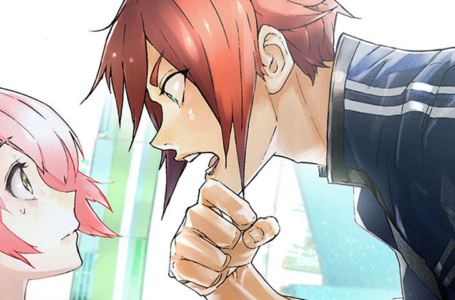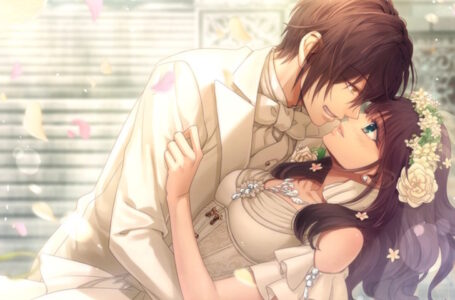What we can learn from the toxic takeaways of otomes
It is finally the time of spooky season, and what better way to celebrate it than looking at one of my favourite genres of gaming — otome games — in a more horrifying scope than usual?
That is at least what I’m spending Halloween doing this year, because after article upon article of gushing about the otome genre, I want to take a different approach and critique it despite my absolute adoration for it. Let’s dig deep into the topic at hand, because after all, nobody’s perfect — and that goes doubly so for some of our 2D boyfriends.
Spoilers for Ron’s route of Norn9 ahead.
Setting up the questionable story
First up, let’s take troublesome storylines as a starting point. We’ll begin with a Nintendo DS title known as Otometeki Koi Kakumei Love Revo!!, which was released in Japan back in 2006, and which has only had a fan translation to date. This game is not looked back on too fondly, and with good reason.
It presents plenty of questionable narrative setups, including a teacher-student relationship, a love interest with an endorsed sister complex, and a heroine who is deemed as unattractive and unappealing due to nothing more than her weight.
Sounding a bit off already? It gets worse; the entire premise of the game is having the heroine win over the affections of a love interest by losing weight after being encouraged to do so after meeting the guys — who are all pretty on the eyes, of course.
And we have our first major issue at hand — she is going on the diet despite not really wanting to, all for the sake of someone else. But we have to question why she’s doing this — because the guys treat her awfully. So awfully, in fact, that it makes it hard for the player to even want to woo them after seeing their attitude and demeaning behaviour towards her simply because she is chubby! They are simply not worth our time, let alone the heroine’s.
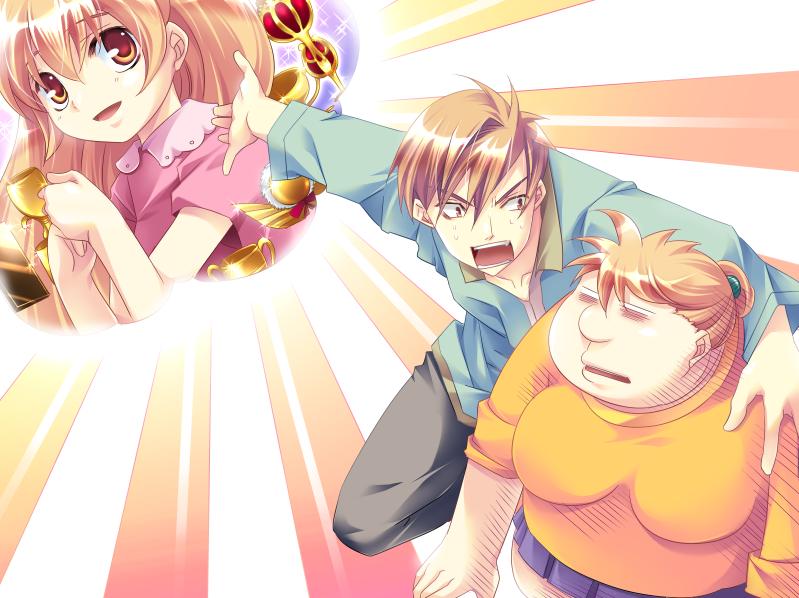
On a different note, let’s touch upon the more widely known troubling title from Voltage’s hefty selection of otomes, and an infamous one at that – Kissed by the Baddest Bidder. Our heroine stumbles upon a secret, exclusive VIP party in the hotel she works in, and ends up being the last item sold during its auction. It’s nice to know what price she is valued at, right? Well, at twenty million dollars, she is efficiently sold and contained within the grasps of the game’s love interests. The romance writes itself from here on out…
The love interests are all characters designed to appeal to the “bad boy” trope, with each one working in some illegal field, all for the sake of their secret, underground network. And things get particularly bad in this one; one particular character treats our heroine as a house pet.
This alone is a huge contrast with love interest pools from other games who are designed around a similar “bad boy” concept, such as those seen in BUSTAFELLOWS and Piofiore: Fated Memories. The love interests of both of these releases respect both the main character as a person and her own boundaries — even though they’re all either morally grey or involved in some shady business. You can be a bad boy without being a bad person.
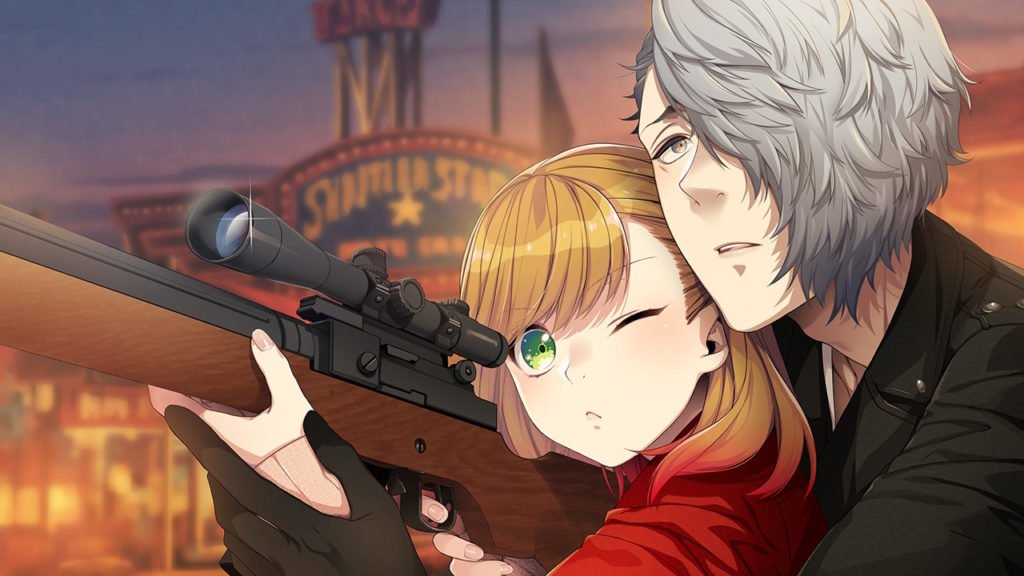
While I have criticised Piofiore: Fated Memories before for how its bad endings perpetuate problematic takes on its characters, at least in that case you can argue that it’s done in the service of either presenting the grim and dark world of life in the mafia, or the worsening of a love interest’s established traits in order to turn them into a monster.
By contrast, I personally found Kissed by the Baddest Bidder borderline offensive at times. Love interests use the heroine as bait, scare her half to death by waving a gun around, plant tracking devices on her — and the heroine even vocally expresses how unhealthy her relationship is with two specific love interests. To name and shame them: Eisuke and Ota.
Then we have the very real problem of the unequal social standing between the main character and the love interests, their contrasting levels of income — and, of course, the fact that she is quite literally “owned” by these men. Their mistreatment of the heroine not only reinforces the possible affect of Stockholm Syndrome, but their actions can lead to romanticising abuse; they remind the heroine that they can resell her, that they can control her, and take ownership of her own life.
For the right player, all this plays out as a fantasy: one of being contained by a group of attractive men in a safe environment. It’s not unlike the widespread appeal of the highly popular Diabolik Lovers series; this features non-human love interests treating the main character quite poorly — supposedly out of love — but that series’ sheer popularity indicates that there are plenty of people into this sort of thing out there. More power to you if you fall into that bracket — we don’t kinkshame for using fiction to fulfil your fantasies around here! It’s just not to my taste personally.

While both of these titles may appear as cause for concern, neither game completely is completely unforgivable; both games have love interests with their own morals and actions that help to highlight their good sides.
There are other games that are less forgivable, though. So without further ado, let’s get into the otome love interests worth complaining wholeheartedly about as we swing our pitchforks at them for their distasteful displays of love.
Toxic characters
This section could simply be a lengthy tick-list of buzz words that we can use to identify love interests who are likely pretty toxic. We’ve previously looked into this with the example of yanderes — love interests who have a twisted sense of what love is and how to express it. So let’s explore some of the related keywords rather than full-on character archetypes — with the first one being one of the main characteristics of a yandere: possessiveness.
We have previously explored Korean developer Cheritz in depth, since they are a company who has set a high standard for otome products. But they still present troublesome characters in their games, especially their casts of love interests. While I feel that Nameless – The One Thing You Must Recall does well in utilising its love interests for dramatic affect in the context of a game being a psychological horror, Dandelion – Wishes Brought to You-, in contrast, hits much harder when it gets dark because of the tonal dissonance.
The characters Jisoo and Jiwoo may be bad in this department, keeping the heroine to themselves and not wanting her to be near any other person (especially if they are male) for the sake of their own peace of mind. But Jiyeon takes the cake for being the worst offender in the game; he’s a defining example of a troublesome, problematic love interest.
He assaults our heroine numerous times — plus he’s manipulative, a liar, untrustworthy, a thief, an arsonist, and he pretty much sexually violates her at one point. Furthermore, their relationship was barely ever romantic or affectionate over the course of the entire narrative, with the pairing not officially getting together until the end of the route. Is this what love is?
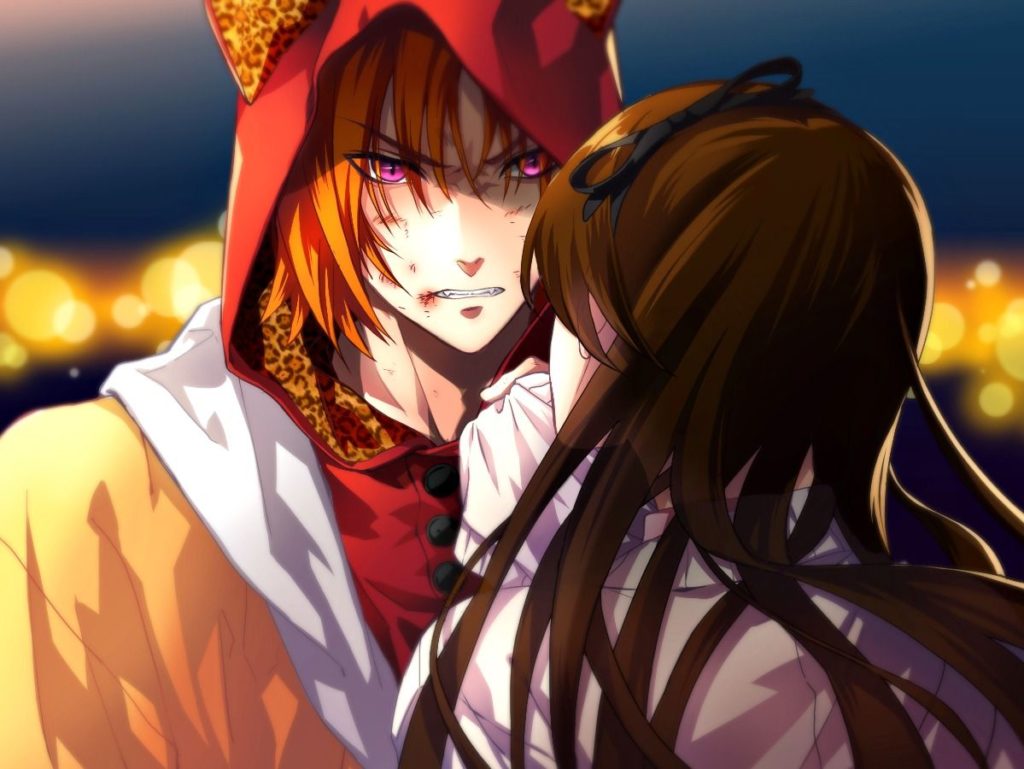
To put it simply, Jiyeon is a dangerous love interest. And he’s not the only one out there; another good example is Japan’s favourite love interest from Amnesia: Memories, Toma.
Yanderes may be the easiest to accuse of being toxic here — as I have already done in the past — yet their very extreme actions are so out of the ordinary that they become clear, obvious fantasy. And, as a result, they can often feel fitting as part of a fictional thriller.
For example, the morally grey Ron in Norn 9 is a very polarising case; his actions throughout the narrative are of no help whatsoever to the main character over the course of his route. But that’s not all; Stockholm Syndrome once again rears its ugly head here.
Ron is extremely pushy, has no problem in overstepping the main character’s boundaries, sees her as nothing short than an object who he blackmails and threatens to kill, and is one of the most manipulative love interests I have ever come across. Period.
And yet his character is highly integral to uncovering more of the game’s overall story and lore details, as well as playing the part of the “villainous” love interest; a type of love interest we do not see all that often. And that’s a whole other can of worms we’ll open up another time!
What’s more, he has to use the main character’s powers in order to forget his past in order to even barely pass as an appropriate and functioning partner because of his murderous habits. Worse yet, in his bad ending, he blindfolds the main character and uses her to make others forget their pasts whenever it suits him, resulting in a heroine who completely loses her sense of self as she becomes mute and unresponsive. Happy times.

Despite all this, my biggest gripe when it comes to toxic attitudes with love interests is with characters who are far more grounded in reality — in other words, the heartless jerk we find in all too many slice-of-life titles.
This troublesome type of love interest can be seen widely in a number of mobile games. Kei from Dangerous Relationship may be one of the most detestable love interests out there — he actually carries out non-consensual sex, and is consistently aggressive towards the main character across his entire route, never seeing any positive development.
Another unforgivable title of the same calibre as this specific example is Office Lovers, where every single LI is as vile as each other. The game continually presents us with situations of sexual harassment, and on top of this, the love interests’ attitudes boil down to being misogynistic; they continually overpower the main character into doing what they want because of their vastly different positions in their workplace.
As we can see, there are a number of unpleasant love interests out there who we are meant to somehow learn how to love — or at least understand how the main character could fall for them, despite our own better judgement warning us of their unworthiness.
Now let’s move on to assess when these pairings are at their worst — but beware, these may be the hottest takes I have yet to mention here.
Presenting bad relationships as a positive
In the same vein as the uncomfortable and unrewarding matching up of Ron and Norn9’s main character Nanami, there are plenty of other couplings within different otome titles that send a rather questionable message of appropriate relationships.
The aforementioned Diabolik Lovers may be the most obvious case, while the same can be said for one of the biggest otome games out there — Amnesia: Memories.
Both titles put their respective heroines in uncomfortable and dangerous situations, surrounded by love interests who have unorthodox ways of exhibiting their supposed love and care for the heroines. We have talked about both at great length before, but the bottom line is that since these questionable guys are love interests, they are rewarded with good endings which can feel undeserved considering their actions in their route, or their behaviour towards the main character
In some cases, this behaviour is demeaning, in some cases it’s literal assault — and of course, there’s plenty of Stockholm Syndrome in the mix, too.
Main characters being Mary Sues is a consistent criticism of the genre too, and a major issue linked to this is how frequent heroines can be seen “fixing” their love interests. A primary example of this trope is with Kei from Collar x Malice, and also with Yosuga from the more recent Olympia Soiree. Both characters and their routes highlight both guys as having death wishes, and our heroines are the only reasons they can overcome their current issues.
It simply has to be her, and no one else — yet this is not how the cookie crumbles in real life. There’s only one other trope I dislike more than this, it is when love interests knew, or were close to the heroine when she was a child. This is quite literally skimmed past in one of my favourite otomes ever, Café Enchanté, but the mobile title Oz+ by Solmare NTT is the worst in this case; its lengthy flashbacks of its heroine and love interests playfully interacting with one another during her developmental period feels unnecessary and uncomfortable.
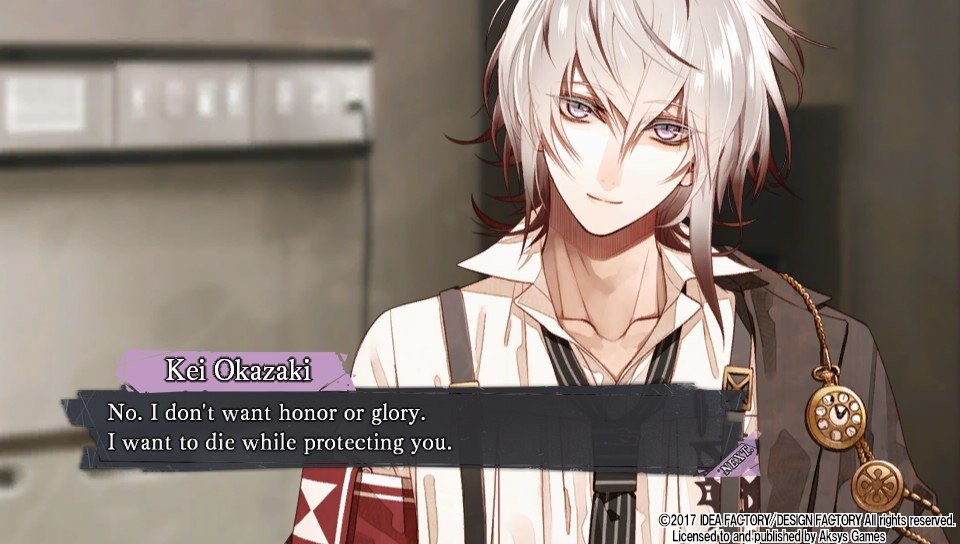
In contrast to these examples, there are some titles out there that do well to not only exhibit and highlight these problematic pairings as what they truly are, but end the routes in question in a way that reinforces the pairing’s incompatibility.
A prime example of this can be seen in Ozmafia!!, with multiple routes not allowing a happy ending despite it being a defining element of the genre and medium. In other cases, we see how toxic behaviour is better handled when paired with well done character development, as seen in Mystic Messenger. 707 has emotional baggage, much like any of the troublesome love interests we have previously mentioned — but he never delves into yandere territory, and instead plays things out realistically by pushing away the main character for her “greater good”.
This is a very natural response to the given situation, and makes us understand, sympathise with and humanise 707. He’s not the only character handled this well in Mystic Messenger, either. Jumin is a highly possessive love interest, with a backstory that reinforces this characteristic. But the game recognises that his behaviour is not healthy, and he actively changes for the better over the course of his storylin.
To return to Ozmafia!! for a moment, I would like to further compliment it in a certain department it does not receive enough recognition for. The game presents the unusual option for the player to indulge in infidelity. Making such a decision drastically hurts the love interest you were first linked to, resulting in their entire demeanour, behaviour and opinion towards you completely altering once the cheating commences. It’s very strange to see this in an otome, but it excels in highlighting how such actions — all too common in the real world — always result in unhappy endings and pain being inflicted upon others. It is simply a great and well-executed lesson to the player about how we can affect others through our actions and decisions.
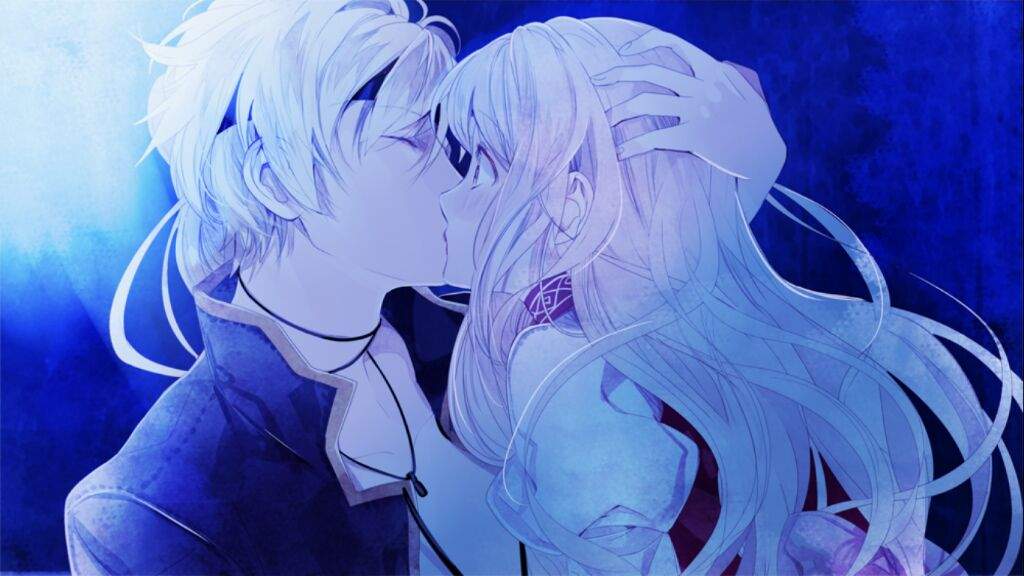
The dreaded words
Now we finally come to the only example that always grates on me – no matter how morally good or bad a love interest is, almost all of them will utter a line similar to the following: “I’m a man, I have impulses, I can’t hold myself back from you.”
This line is not exclusive to a certain archetype. From a more recent example, the usually harmless Riku of Olympia Soiree says a line like this as things heat up between him and the heroine. It’s completely unbecoming of his character, and instead awkwardly reads as a line its writers simply had to include, even if it does not fit the character’s traits and speech as established up until this point. And then the realisation hits: this is one of the most common and unnecessary tropes within the medium.
Then we have Collar x Malice’s Kei, who, upon entering the main character’s home for the very first time, mentions how unbecoming it is that our heroine, as a woman, allows a man to enter her home without any issue. And our main character reaffirms this stance. The line itself suggests a warning about Kei’s character, or perhaps the highlighting of there being sparks between them.
Ultimately, any time this line is seen or said, it suggests that the love interest is untrustworthy, and the very worst part is the real-world implications of this — the idea that men do no have self-control and that women should be guarded around them at all times. While it reinforces the stereotypical masculinity of the love interests and adds sexual tension, it is a tiresome trope that is all too commonly used to move along the romance; it just feels a bit lazy at times.
It also reinforces the stereotype that most main characters are inexperienced in romance, as their default response is almost always blushing or stuttering, resulting in the men chastising them for their behaviour — as if they do not understand how to appropriately behave around them. Furthermore, it presents something of an unfair generalisation of men’s attitudes; not all men’s thoughts when alone with someone they are interested in immediately turn to irresistible sexual urges.
All up to perception
At this point, we have covered a lot of ground about the toxicity of what the otome genre can present at times — and we can clearly identify a main conclusion after all of this — exactly how “problematic” these traits are will always be up to the individual player’s response.
For example, I cannot stand love interests like Collar x Malice’s Takeru, since he constantly belittles the main character’s intelligence. But this is a personal gripe of mine as it’s a problem I carry around about myself — yet elsewhere in the otome enthusiast community, Takeru has his own fans.
Meanwhile, I have an odd fascination for Piofiore: Fated Memories’ Nicola, who gives constant red flags and goes outright insane by his bad ending — but his usual demeanour is charismatic and enchanting enough to have me enjoy him, even knowing he has his troublesome elements.
I take a similar, yet more unpopular stance towards Amnesia: Memories’ love interest pool. Shin is one of my most disliked love interests of all time for his attitude towards the heroine (if this is love, I don’t want it, Shin) — and I would actually take Toma over him any day for his more friendly and approachable personality.
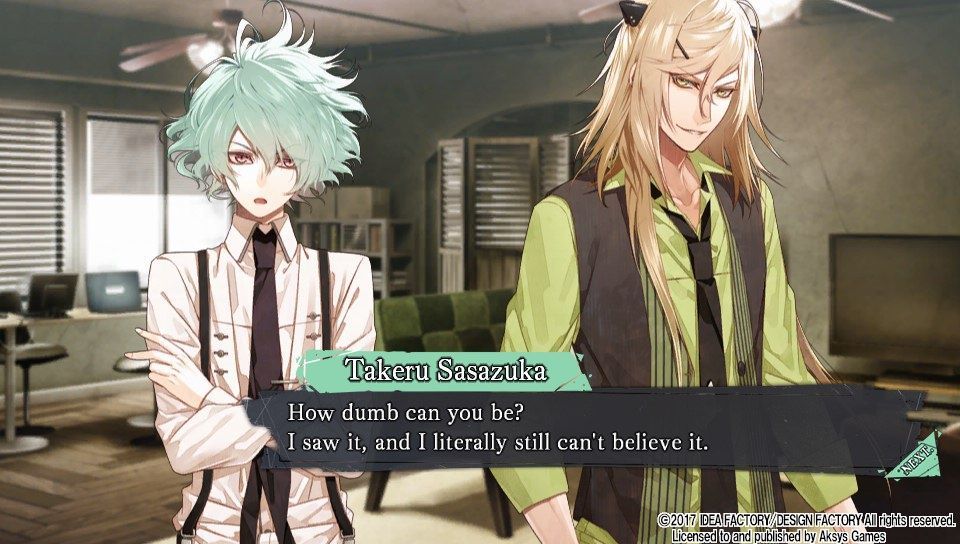
It’s quite the contradiction, but that in itself makes for a certain degree of entertainment. Our preferences are not always concrete, even if we have a type of love interest archetype we fall for more often than not. Unusual and challenging characters keep the plot interesting by bringing something new and different to the table, with many examples actually adding a new narrative genre to the game as a whole. For example, Amnesia: Memories’ Toma, Piofiore: Fated Memories’ Yang and Norn9’s Ron all add thriller elements to their respective games that might not otherwise be there.
Finally, there are a number of otomes out there that feature an entire array of love interest who are troublesome purely for the sake of adding to the drama and darkness of the plot; in these cases, the creators of the best games respect and show that they should absolutely not be idealised. Black Wolves Saga is a great example of this — as is, of course, the aforementioned Diabolik Lovers.
Lessons worth learning
This should go without saying, but no matter how something is presented in what games we play, it is up to us as individuals to determine whether it is a “positive” or “negative” factor. For example, no matter what we think of them, yanderes are undoubtedly an extremely popular archetype — and dangerous love interests can add a different take on the usual otome game formula. Such tropes can even be seen as memorable red flags for the player’s own experiences in love in the real world, and can be especially educational for the younger player.
Many of these examples are culturally bound, so it’s unlikely we’ll see them changed any time soon — except in cases where game like this are developed in the west and deliberately designed to challenge established tropes. But in the end, even the “negative” tropes add a massive amount of variation to the titles we already know and love.
We either love tropes, or see them often enough times that they have us rolling our eyes at their frequency. But the genre would not be the same without them, let alone the individual stories.
I have previously made the same point as to why visual novels are good for gamers, and it is of importance here too – these “problematic” elements within the genre have their value, whether it’s for shallow reasons — even I can admit that Piofiore’s Yang is too hot to deny — or as a means of exploring more challenging, roller-coaster relationships through a screen as a sort of “safe space”.
Even if the game fails to recognise that the trope in itself does not send a positive message, we know, and we have every right to perceive it in the way we do — even if it means leaving the route or game unfinished out of our own dissatisfaction with a character — or, at the other end of the spectrum, taking guilty pleasure from it.
Join The Discussion
Rice Digital Discord
Rice Digital Twitter
Rice Digital Facebook
Or write us a letter for the Rice Digital Friday Letters Page by clicking here!
Disclosure: Some links in this article may be affiliate links, which means we may earn a small commission if you make a purchase after clicking on them. This is at no additional cost to you and helps support Rice Digital!
- Sigh of the Abyss: Shadow Bonds – Prologue Review - October 7, 2023
- Is She The Wolf? is wickedly addicting TV - October 6, 2023
- The steady consumption of Slow Damage - October 5, 2023




